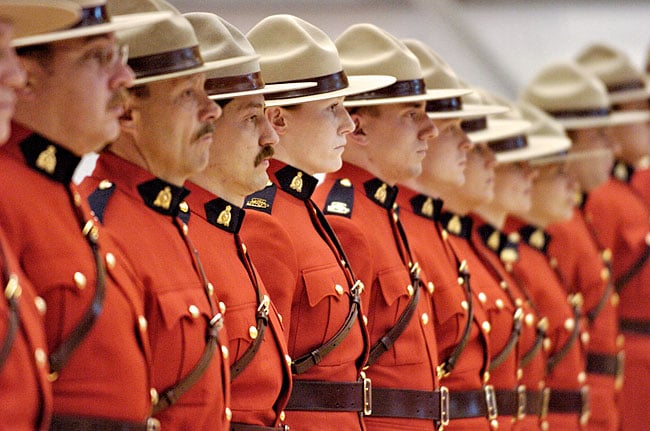A judge says two lawsuits against the RCMP can proceed as a class action, involving all women who’ve ever worked for the force.

A proposed agreement to compensate women who endured sexual harassment as employees of the RCMP has passed a key hurdle, with a Federal Court judge agreeing two lawsuits against the police force can proceed as a class action.
In certifying the class action, Judge Ann Marie McDonald said she was satisfied the women have shown they have reasonable grounds to press their lawsuit.
McDonald also approved the proposed definition of class members - essentially all women who work for, or did work for, the RCMP starting in 1974.
While individual claims will have to be assessed, McDonald found that a class action is preferable to forcing victims to press claims on their own.
``Based upon the information provided by the RCMP, there may be as many as 20,000 females who qualify as primary class members,'' the judge said in her written decision. ``Individual actions would be inefficient and uneconomic.''
Former RCMP officers Janet Merlo and Linda Davidson, both of whom say they suffered gender-based discrimination and harassment, are appropriate as representative plaintiffs, the ruling states.
Certification of the class action, which Ottawa did not oppose at a hearing last week, paves the way now for the court to give its blessing to a tentative settlement reached last May between the federal government and the women.
A formal approval hearing is likely in May, according to the women's lawyers.
In the interim, a publicity blitz via direct mail and through the media is expected to get underway to alert affected women to the class action and to give them 60 days to opt out if they wish. Victims also have an opportunity to comment on the fairness of the settlement before the approval hearing.
The tentative deal, which would be administered by retired Supreme Court of Canada justice Michel Bastarache, creates six categories of claimants. Those who suffered the most egregious abuse would be eligible for up to $220,000. In some cases, family members of the RCMP employees would also be eligible for cash.
Merlo, now of St. John's, N.L., was an RCMP constable from 1991 to 2010. She suffered depression, panic attacks and other health effects due to her mistreatment, court has heard. She began her claim in British Columbia in 2012.
Davidson, 58, now of Bracebridge, Ont., filed her suit in 2015 in Ontario. Starting with the RCMP in 1985, she is one of the few females to reach a commissioned officer's rank. She was an inspector when she took medical leave in 2009, suffering from anxiety, depression and other health issues, and retired in 2012.
In May last year, the two sides reached the tentative deal to compensate women who experienced workplace sexual harassment or gender-based discrimination while working for the RCMP. Details were announced in October and Commissioner Bob Paulson apologized for having failed the women.
In addition to compensating the women - Ottawa has set aside about $100 million - the RCMP has also agreed to address systemic issues of gender-based harassment and discrimination.
In certifying the class action, Judge Ann Marie McDonald said she was satisfied the women have shown they have reasonable grounds to press their lawsuit.
McDonald also approved the proposed definition of class members - essentially all women who work for, or did work for, the RCMP starting in 1974.
While individual claims will have to be assessed, McDonald found that a class action is preferable to forcing victims to press claims on their own.
``Based upon the information provided by the RCMP, there may be as many as 20,000 females who qualify as primary class members,'' the judge said in her written decision. ``Individual actions would be inefficient and uneconomic.''
Former RCMP officers Janet Merlo and Linda Davidson, both of whom say they suffered gender-based discrimination and harassment, are appropriate as representative plaintiffs, the ruling states.
Certification of the class action, which Ottawa did not oppose at a hearing last week, paves the way now for the court to give its blessing to a tentative settlement reached last May between the federal government and the women.
A formal approval hearing is likely in May, according to the women's lawyers.
In the interim, a publicity blitz via direct mail and through the media is expected to get underway to alert affected women to the class action and to give them 60 days to opt out if they wish. Victims also have an opportunity to comment on the fairness of the settlement before the approval hearing.
The tentative deal, which would be administered by retired Supreme Court of Canada justice Michel Bastarache, creates six categories of claimants. Those who suffered the most egregious abuse would be eligible for up to $220,000. In some cases, family members of the RCMP employees would also be eligible for cash.
Merlo, now of St. John's, N.L., was an RCMP constable from 1991 to 2010. She suffered depression, panic attacks and other health effects due to her mistreatment, court has heard. She began her claim in British Columbia in 2012.
Davidson, 58, now of Bracebridge, Ont., filed her suit in 2015 in Ontario. Starting with the RCMP in 1985, she is one of the few females to reach a commissioned officer's rank. She was an inspector when she took medical leave in 2009, suffering from anxiety, depression and other health issues, and retired in 2012.
In May last year, the two sides reached the tentative deal to compensate women who experienced workplace sexual harassment or gender-based discrimination while working for the RCMP. Details were announced in October and Commissioner Bob Paulson apologized for having failed the women.
In addition to compensating the women - Ottawa has set aside about $100 million - the RCMP has also agreed to address systemic issues of gender-based harassment and discrimination.
- The Canadian Press





